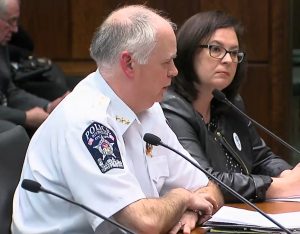Kids programs bring down crime, police tell state lawmakers
By Jean Lotus Staff reporter — May 10, 2016
Riverside Police Chief Tom Weitzel speaks to Springfield lawmakers about the importance of children’s social service programs April 27. (Photo courtesy of Fight Crime: Invest in Kids Illinois)
Illinois legislators in the General Assembly were surprised when Riverside Police Chief Tom Weitzel came to testify at the Illinois House Appropriations Human Services budget hearing, April 27 in Springfield, the chief said.
“They didn’t expect law enforcement to be there,” Weitzel said. “They asked me what’s a police chief doing here among all these social service providers?”
Weitzel, who serves on the executive board of Fight Crime: Invest in Kids Illinois had a simple message for the state: Social service programs that help children keep juveniles out of the criminal justice system. The programs also save money in the long run, he said.
“We represent a growing consensus among law enforcement that if we’re serious about cutting crime, we must do everything we can to put children on the right path at the very beginning of life,” he told lawmakers. “And we must do what it takes along the way to keep them there.”
The Illinois budget impasse has frozen funds for the state’s human services programs for almost a year, Weitzel said, and organizations that help children are at the end of their resources.
“There is little question that profound damage has been done [to these agencies] and over time, we’ll pay the price in many ways — including compromised public safety.”
Weitzel urged lawmakers to restore funding to four programs: ReDeploy Illinois, Teen REACH, Comprehensive Community-Based Youth Service and “parent coaching” programs.
“I truly believe in these programs,” he said later in a telephone interview. “This is not an inner-city problem. From Peoria to Danville to Rockford to Franklin County — all these places have lost these services.”
Weitzel said youth programs such as services from ReDeploy Illinois saved the state money and resources. Working with around 300 youth through ReDeploy Illinois would cost about $1.6 million, Weitzel said. But because in 2015 the program closed offices in 25 counties, those juveniles were diverted to the juvenile justice system, costing $32.7 million and causing a 65 percent spike in the Department of Juvenile Justice population.
Weitzel said parents have come to depend on well-run afterschool programs such as Teen REACH, that kept at-risk teens out of trouble in the afterschool hours police officers call “prime time for juvenile crime.”
“We’re seeing at-risk kids going about their ways in unstructured atmospheres without having close supervision,” Weitzel said.
Bike thefts, petty crimes and shoplifting have seen an uptick, he said.
“We don’t want to arrest these juveniles,” he said. “We don’t want them to get caught up in the Cook County Criminal Justice system. They have one or two misdemeanors and at 22 it’s on their record when they are trying to get a job.”
Sally Puleo, deputy director of Fight Crime: Invest in Kids Illinois said the organization speaks for 350 Illinois members made up of police chiefs, sheriffs, prosecutors and victims of violence.
“We are the law enforcement voice in the public discussion on what works to fight crime,” Puleo said. “From law enforcement experience, we know why it’s so important to invest in kids early in life and find intervention for kids when they do get in trouble.”
Puleo said the state’s law enforcement community is worried that the criminal justice system will “become a catch-all if we don’t provide an alternative.”
Weitzel said he knew of some social service organizations that were “taking out private loans” to keep their doors open and pay their staff.
“They have dedicated employees who are dedicated public servants and they are keeping their doors open, sometimes working without checks for months,” he said.
Weitzel got to speak with Gov. Bruce Rauner and Democratic leaders, but, he said, “There’s such a divide of philosophies between the Democrat and Republican side that nothing is getting done.”
He said the only way to move forward is to find areas to compromise.
“I told them, ‘If I operated like you do, my village would fire me.’”
Puleo said she hoped the voices of law enforcement would spur the General Assembly to move past the state budget impasse.
“The good news is, we know there are things that really work to turn children’s lives around and start them off right. We just have to value those things enough to give them appropriate funding and keep them funded.”
Read the current issue of the Cook County Chronicle
Free digital subscription to the Cook County Chronicle
— Kids programs bring down crime, police tell state lawmakers —



